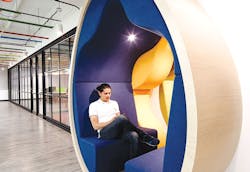More Than 37% of U.S. Workers are Sleep-Deprived
You may operate a hospital facility with many patients to service at a moment’s notice. Your portfolio may include blue-collar employees who work the night shift, doing dangerous work at risky hours.
And because of improper sleep, they may be putting themselves at high risk.
A National Safety Council study finds that a large percentage of employees are sleep-deprived, with 37% of workers claiming to not having enough sleep in their routines, with the most at risk working the night shift or irregular shifts.
Key findings from the study include:
- 62% of night shift workers complain about sleep loss
- Fatigued worker productivity costs employers $1,200 to $3,100 per employee annually
- Employees on rotating shifts are particularly vulnerable because they cannot adapt their "body clocks" to an alternative sleep pattern
- You are three times more likely to be in a car crash if you are fatigued
- Losing even two hours of sleep is similar to the effect of having three beers
- Chronic sleep-deprivation causes depression, obesity, cardiovascular disease and other illnesses
While there is no better alternative to sleep deprivation besides regular and routine bouts of sleep, preferably in the range from seven-to-nine hours per night for the average working adult—there are ways that you as a facility manager can improve the sleep of occupants directly in the workplace.
For example, exposing employees to natural light via windows near their workstations can induce increased productivity at work and can improve overall sleep when they are off the clock. Persons who expose themselves to outside light during work hours get an average of 46 minutes less sleep per night than their counterparts.
